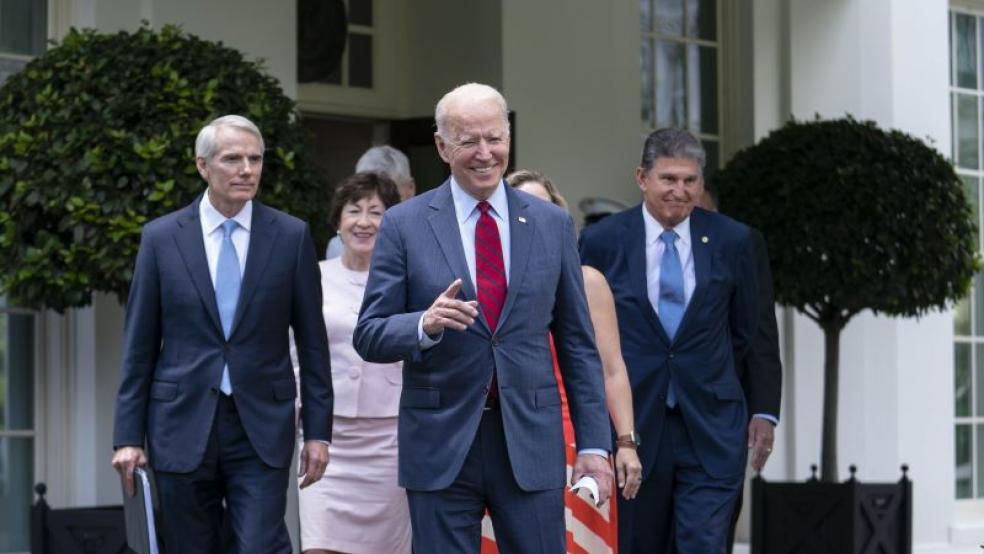Well, that didn’t take long.
Less than 24 hours after President Joe Biden stood on the White House driveway with a bipartisan group of senators and announced a roughly $1 trillion agreement on an infrastructure package, the deal is teetering amid accusations of treachery and foul play.
At issue is Biden’s statement that he won’t sign an infrastructure bill unless it is accompanied by a separate, likely much larger reconciliation package that provides more of the things that he has called for, including substantial federal investments in green energy and “human infrastructure” such as elder and child care.
“Extortion!” Some Republicans said the explicit link between the two infrastructure packages violates the spirit of the bipartisan agreement. “If reports are accurate that President Biden is refusing to sign a bipartisan deal unless reconciliation is also passed, that would be the ultimate deal breaker for me,” Sen Lindsey Graham (R-SC) tweeted.
In an interview with Politico, Graham, who was one of 11 Republicans who supported the agreement, was a bit more heated: “If he’s gonna tie them together, he can forget it!” he said. “I’m not doing that. That’s extortion! I’m not going to do that. The Dems are being told you can’t get your bipartisan work product passed unless you sign on to what the left wants, and I’m not playing that game.”
Other Republican senators expressing concerns include key moderates Mitt Romney (UT), Susan Collins (ME) and Rob Portman (OH), with the latter reportedly feeling “pissed and disappointed” by Biden’s approach. Sen. Bill Cassidy (LA) said he felt “blindsided,” while Sen. Jerry Moran (KA) is reportedly seeking reassurances from Democratic Sens. Joe Manchin (WV) and Kyrsten Sinema (AZ) that they do not support Biden’s plan.
Senate Minority Leader Mitch McConnell (R-KY) also weighed in, accusing Biden of “caving” to progressive Democrats. And House Minority Leader Kevin McCarthy (R-C) said he didn’t think Biden’s plan would work. “I don't think that's going to pass,” he said. “I think they killed any opportunity.”
White House pushes back: Press Secretary Jen Psaki told reporters that Republican complaints were “absurd.”
“I think the American people are quite focused on how we’re getting work done on their behalf, less focused on the mechanics of the process,” Psaki said. “Now it is up to Republicans … to decide if they are going to vote against a historic investment in infrastructure that’s going to rebuild roads and railways and bridges in their communities, simply because they don’t like the mechanics of the process.”
Still, not all Democrats are on board with Biden’s approach. Rep. Kurt Schrader (D-OR), a member of the Blue Dog Coalition, told Roll Call that he plans to vote against a reconciliation package due to concerns about its expected size and increase in deficit spending. And Rep. Dean Phillips (D-MN) said that he does not support linking the bipartisan agreement and the reconciliation package. “I think this is important that we demonstrate that this place can operate,” he told CNN. “And if we end up getting nothing done because of the objections of either the left or the right, and then shame on all of us.”
Trying to have it both ways? The rapid deterioration of the bipartisan agreement highlights tensions in Biden’s approach to governance, says The New York Times’ Jim Tankersley. “President Biden’s bipartisan infrastructure agreement contains all of the contradictions and promises of the Biden brand,” Tankersley writes.
On the one hand, Biden wants to achieve a bipartisan agreement, but as Republican complaints Friday indicate, that won’t be easy and may in fact be impossible in the current political environment. On the other hand, Biden wants to transform that government along the lines of Franklin Delano Roosevelt or Lyndon Baines Johnson but lacks the overwhelming majorities in Congress to make that happen.
One possible outcome, Tankersley says, is a loss on both counts as Republicans abandon the plan and take enough centrist Democrats with them to scuttle a reconciliation package. At the same time, the Republican rejection of the bipartisan plan could backfire on the GOP, giving Biden the cover and support he needs to put his more ambitious plans into play.
“Mr. Biden has now achieved the appearance of bipartisanship, whether it ultimately endures or not,” Tankersley writes. “And that appearance, by itself, could give him the political fuel he needs to push a far more aggressive plan into law.”
What comes next: Although Republicans who negotiated the bipartisan are reportedly meeting Friday to discuss withdrawing their support, lawmakers are still expected to push ahead on Democrat’s two-track approach. Politico broke the timeline down as follows:
1) The Senate writes a bipartisan infrastructure bill before the August recess, with the House following up with a similar bill.
2) Both the House and the Senate pass budget resolutions before the August recess, unlocking the reconciliation process.
3) The budget resolution contains instructions that allow Democrats to write a reconciliation bill during the recess that contains everything left out of the bipartisan infrastructure bill.
4) In September, lawmakers vote on both bills, with the goals of getting them to the White House before the end of the month.
The plan has plenty of weak points, including the potential collapse of bipartisanship, Democrats’ miniscule majority, and the issue of paying for or offsetting all the new spending in the bills. If Republicans withdraw their support, Democrats say they will attempt to pass everything in a single reconciliation bill, which could come with a $4 trillion price tag (with Sen. Bernie Sanders (I-VT) pushing for $6 trillion) over eight years. And if Democrats do move ahead with a massive reconciliation package, expect to see plenty of fireworks over its size and scope this fall, with centrist lawmakers like Manchin and Sinema playing a key role in the debate and the outcome.




